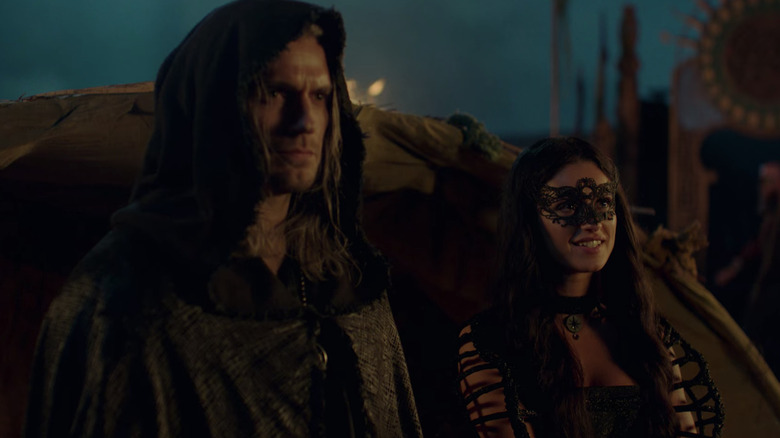The Witcher S3: Belleteyn & Ciri's Birthday Explained
At the beginning of "The Witcher" Season 3, Geralt of Rivia (Henry Cavill) and Yennefer of Vengerberg (Anya Chalotra) are not on speaking terms after Yennefer attempted to sacrifice Ciri (Freya Allen) to regain her lost power in Season 2. As such, the on-again-off-again relationship between the Witcher and the Sorceress is at a new low when we begin Season 3, and later on in Episode 1 we see Yennefer and Geralt discussing their past relationship problems during a festival for the holiday "Belleteyn"
Belleteyn, sometimes called "Beltane," "May Day," or "Blossoming," is a holiday from "The Witcher" franchise that takes place from the night of April 30 into May 1. The Belleteyn festival itself centers around fertility and new life and is said to be the perfect occasion to commit to new relationships and marriages. Celebrations for Belleteyn often include eating, drinking, and making love, as well as an odd tradition where Belleteyn participants jump over live bonfires to boost their fertility.
Although this festival might seem like just a simple background setting for Geralt and Yennefer's relationship woes, the holiday is also significant because Ciri was actually born during Belleteyn. What's more, it's revealed later in the episode that Yennefer was also born on Belleteyn — which means that the two people Geralt of Rivia cares about most actually share the same birthday.
Major births or events always seem to line up on Belleteyn
While it's certainly interesting that both Yennefer and Ciri were born on the same holiday, it's worth noting that Ciri's birth is particularly miraculous in the context of the series as a whole. Not only was Ciri the "Child of Surprise" born to Geralt after he lifted a curse from her father, Duny (Bart Edwards), but she is also born with the rare genetic gift of "Elder Blood" that was passed down from the Sorceress Lara Dorren.
This genetic gift places her at the center of a prophecy made by an ancient elven oracle named Ithlinne, who claimed that "an offspring of the Elder Blood" would one day appear and reclaim the Continent for the elves. Because fate and destiny are such important concepts within "The Witcher," the fact that Geralt's Child of Surprise and the Prophecy of Ithlinne both correspond to Belleteyn makes the holiday incredibly significant — especially when you remember that Yennefer was also born during that very same holiday.
The fact that all of these events line up on Belleteyn makes it clear that the holiday is vital to the destinies of Yennefer, Geralt, and Ciri, and though we may never know why this fertility festival holds so much meaning to their story, the importance of Belleteyn in "The Witcher" cannot be overstated.

